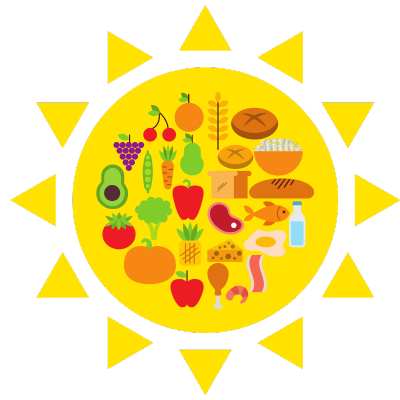Proper nutrition plays a vital role in maintaining healthy skin, and it is not only essential for its appearance but also for aging prevention and remediation. While focusing on nourishing your skin from within, it’s crucial to also consider the impact of sun exposure on skin health. The following ten tips will help you optimize your skin health through food, with an emphasis on sun protection. By incorporating these recommendations into your diet, you can take proactive steps to support your skin’s health and protect it from the harmful effects of the sun. 1. Increase dietary fibre to optimize your gut microbiome, improve metabolic health, and manage weight. Adult recommendations are 30-38 grams per day for men and 21-25 grams per day for women. Most Canadians do not meet half this amount, and some research suggests these guidelines are too low!
1. Increase dietary fibre to optimize your gut microbiome, improve metabolic health, and manage weight. Adult recommendations are 30-38 grams per day for men and 21-25 grams per day for women. Most Canadians do not meet half this amount, and some research suggests these guidelines are too low!
2. Diversify your variety of plant-based foods to optimize your gut microbiome and reduce inflammation – Aim for a minimum of 30 different plant-based foods per week. That includes herbs, spices, teas!
3. Enjoy foods rich in antioxidant vitamins A, C, and E to prevent oxidative damage and support immune health. Choose colourful fruits and vegetables (Ex. orange vegetables, citrus fruits), nuts and seeds to help you get these essential nutrients.
4. Increase phytonutrient (plant-nutrient) intake to help prevent oxidative damage. There are many types, including: lycopene in tomatoes, curcumin in turmeric, resveratrol in grapes, catechins in fruits and dark chocolate, and polyphenol rich green and white teas. Think “colour” while in the produce aisle.
5. Shift your dietary fat intake towards unsaturated fats to reduce inflammation, oxidative stress, and the effects of photoaging. Examples include omega-3 (Ex. fatty fish, walnuts, hemp hearts, and flax), and monounsaturated fats (Ex. olive oil, avocados, nuts, and seeds). Saturated fats should be minimized.
6. Achieve adequate protein to optimize hair, skin, and nails. Depending on your lifestyle factors and age, your daily protein needs vary from 1.0-1.7 grams per kilogram body weight. Including plant-based proteins often (Ex. soy, legumes, quinoa, hemp, pumpkin seeds) can help you combine the tips shown here!
7. Decrease your intake of added sugar and ultra-processed foods. These foods are typically high glycemic index, pro-inflammatory, and may take the place of foods and nutrients that support skin health
8. Include foods that support hyaluronic acid production, such as soy products ((Ex. tofu, tempeh, edamame), starchy root vegetables (Ex. Sweet potatoes), kale, almonds, and sweet potatoes. Oranges also contain an antioxidant (naringin) that blocks the enzyme that breaks down hyaluronic acid.
9. Work with a Registered Dietitian – a dietitian can perform a detailed assessment of your lifestyle, current diet habits, and goals. From there, they help you create personalized, actionable nutrition strategies and goals to help optimize your skin and overall health.
10. Investigate your genes with Nutrigenomics! This new evidence-based tool is available as an add-on service, delivered by Preventous Registered Dietitians – You can also add an analysis of skin health-related genes.
Contact to learn more!
What about supplements?
Foods have thousands of bioactive molecules and is one reason why research suggests a food-first approach. However, in some cases, supplementation may be needed to optimize or “fill the gap.” Speak with your healthcare provider to strategize your diet and potential supplementation needs.
Daniel Neumann
Registered Dietitian
